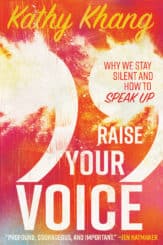
Kathy Khang is coming to Eastern University on Friday, September 27th!
Windows on the World: Kathy Khang
September 27, 10:00 AM
Eastern University | St. Davids Campus
“Raise Your Voice: Embodying the Body of Christ in Word and Deed”
Kathy Khang will interrogate the U.S. church’s silence around injustice, using the separation of church and state as an excuse, while taking advantage of tax deductions and exemptions to protect the financial well-being of institutions over the well-being of people. Kathy will draw from her recent book, Raise Your Voice: Why We Stay Silent and How to Speak, to examine the implications of staying silent, and the importance of raising our voices and using our influence to bring about the Kingdom of God on earth as it is in heaven.
If you’re in the area, we hope you can join us!
The world is a noisy place. Smart phones. Smart watches. Alerts. Notifications. Social media. Satellite radio. Streaming video. News 24/7. On any given Sunday morning in church, don’t be surprised if you hear a guitar or keyboard playing softly in the background during the announcements or prayer. Culturally, it’s almost as if we are uncomfortable with silence.
Yet when people rise up and collectively make some noise, public displays of personal opinions are often closely monitored and critiqued. I was raised to believe public protests were dangerous, disrespectful, disruptive, and, therefore, inappropriate. Those adjectives have been used frequently to describe recent protests against white supremacy and for immigration reform.
Using my voice has mostly been through speaking and writing, not using my body in protest. But as my convictions have deepened and life experiences have changed me, I’ve chosen to march in support of #BlackLivesMatter and against the Dakota Access Pipeline, the Muslim travel ban, and a recent president. Bethany and I also marched together with three Asian American friends at the Women’s March on Washington in January 2017 because we wanted to make sure our voices were both seen and heard as Christian women of color. I find the news coverage, police presence, and public commentary around those events fascinating. Different voices—such as women, people of color, LGBTQIA—are critiqued, praised, dismissed, ignored, or judged on who should or should not participate. Why can’t someone participate if they want to?
Different voices—such as women, people of color, LGBTQIA—are critiqued, praised, dismissed, ignored, or judged on who should or should not participate. Why can’t someone participate if they want to?
Public protest and free speech are protected under the law, but that doesn’t mean there aren’t consequences. There are days when it feels like you can’t win. If you stay silent, you might find yourself on the wrong side of history. Or you might be seen and heard, and then wish you hadn’t. Demonstrations from Charlottesville to Venezuela have proved deadly and dangerous for protesters. You might find yourself completely misunderstood after speaking up. Even worse, instead of believing your accounts of experiences with racism or injustice, people may question your perspective or accuse you of exaggerating, lying, or playing the race card. They reframe your story and change it to make it appear that you were actually the aggressor. After being attacked for sharing, you might even begin to question your memory of the experience.
But then you’ll realize the truth—you were the victim of a racist or unjust incident and now have been gaslighted by those who don’t want to believe you.
It’s no wonder people are opting out of social media, trading in their smartphones, and deciding it’s better to stay out of the public and even private square. It’s become a common Lenten practice for some to give up social media or temporarily deactivate their social media accounts. I have one friend who has gone back to using a basic flip phone to keep him from engaging in the public sphere when he’s away from a computer.
At some point in our lives, we learn to communicate, whether verbally or non-verbally. But most of us are also taught to silence ourselves or to stay out of the conversation for self-preservation. We are taught to avoid conflict, keep the peace, and keep our personal opinions to ourselves because we’re told that speaking out doesn’t actually affect change. However, self-preservation takes on a different sense of urgency and meaning as the national and global political landscape continues to shift. The North American church is again engaging in conversations around race and justice, but because of its past failures and current blind spots, the conversation often resorts to simplified binaries such as white and black, men and women, privileged and lack of privilege, citizen and undocumented—and the refusal to dig deeper into racist and unjust systems can widen the chasm.
I believe that Christians desire and can handle more complexity. Race and reconciliation can no longer be framed solely as a justice issue but rather as core to the gospel, theologically grounded in the imago Dei (the image of God). As Christians, if we truly believe we are all created in God’s image, and that God the Creator had a hand in developing, creating, and shaping not just our embodied souls but also the places and spaces we steward and have dominion over, then reconciliation with one another is not merely an option—it’s part of God’s mandate. It requires us to speak up and speak out. In order to do so, we need to address personal development, which happens within the context of the community. In some communities, certain voices are erased and suppressed while others are amplified and elevated. The concept of “voice” isn’t only what is said or written but also includes how identity is expressed in words and deed. Voice is not limited to what comes out of my mouth but out of my being.
Race and reconciliation can no longer be framed solely as a justice issue but rather as core to the gospel.
The Latin word vox, meaning “voice,” and the related word vocāre, meaning “to call,” give us the root voc or vok. Words from the Latin vox or vocāre have something to do with the voice or with calling. Anything vocal is produced by the voice. A vocation is the work that someone is called to do as a job. To evoke is to call forth. To invoke is to call on for aid or protection. To provoke is to call forth another’s anger. The word voice also has vox as its root.
The challenge to raise your voice is about doing the good work of the good news. It’s about calling forth others: an invocation for all and a provocation to some. Our lives should affect the world around us if we are bearers of God’s image as well as an embodiment of good news. Living as a Korean American Christian woman, there is something critical about speaking from a place of wholeness and uniqueness that makes my voice part of a community but also uniquely mine. It fills in the blanks left in others’ stories. When more of us from different intersections and margins raise our voices, we live a fuller picture of the good news.
 Kathy Khang is a writer, speaker, and yoga teacher based in the north suburbs of Chicago. You can connect with Kathy on her blog, on Facebook, on Twitter, and on Instagram. This excerpt is adapted from Raise Your Voice: Why We Stay Silent and How to Speak Up by Kathy Khang. Copyright (c) 2018. Published by InterVarsity Press, Downers Grove, IL.
Kathy Khang is a writer, speaker, and yoga teacher based in the north suburbs of Chicago. You can connect with Kathy on her blog, on Facebook, on Twitter, and on Instagram. This excerpt is adapted from Raise Your Voice: Why We Stay Silent and How to Speak Up by Kathy Khang. Copyright (c) 2018. Published by InterVarsity Press, Downers Grove, IL.


